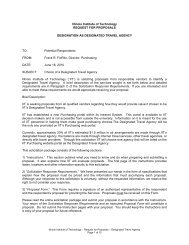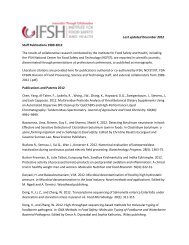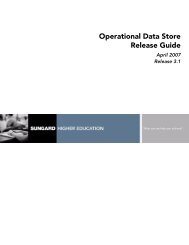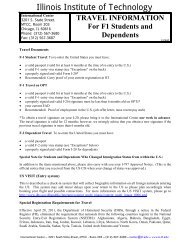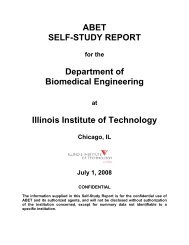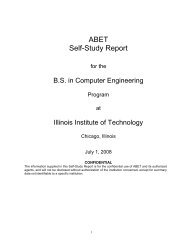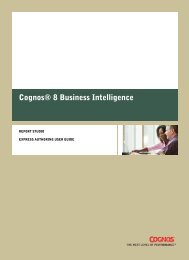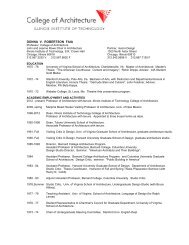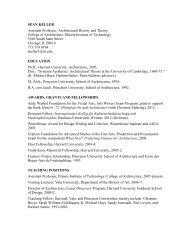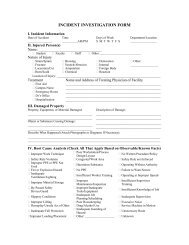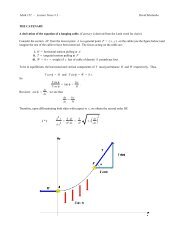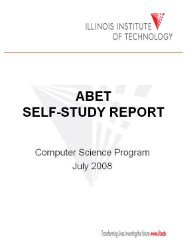Download entire Student Handbook - Illinois Institute of Technology
Download entire Student Handbook - Illinois Institute of Technology
Download entire Student Handbook - Illinois Institute of Technology
Create successful ePaper yourself
Turn your PDF publications into a flip-book with our unique Google optimized e-Paper software.
A student not from the same department as the grievant, to be recommended by the campus<br />
student government and appointed by the campus student affairs <strong>of</strong>ficer.<br />
After the grievance is disclosed to those selected to serve on the Grievance Committee, any member who<br />
believes that bias might be inferred by his or her participation in hearing the specific grievance may submit<br />
to the Provost a request for replacement along with the reasons for making such request. The Provost will<br />
make the decision as to whether the member should be excused from or retained on the committee. If the<br />
decision is to excuse the petitioner, the Provost will select a replacement.<br />
After composition <strong>of</strong> the grievance committee to hear a specific grievance has been determined, the<br />
committee shall recommend a chair from among its membership to the Provost for consideration. The<br />
Provost will appoint the chair.<br />
3. Grievance Committee Procedure<br />
At the initial meeting <strong>of</strong> the grievance committee, where the recommendation <strong>of</strong> a chair is discussed, the<br />
committee will establish a hearing date. Upon appointment by the Provost, the chair will communicate to<br />
the parties the date <strong>of</strong> the hearing and names <strong>of</strong> the members <strong>of</strong> the grievance committee. Any involved<br />
party who believes a member <strong>of</strong> the committee to be biased against that party may request that such<br />
person be excused. That request must be submitted in writing with reasons for the request to the Provost,<br />
who will decide whether or not to grant the request.<br />
If the decision is made to excuse that person, the Provost will select a replacement. Each involved party<br />
may be represented by an advisor. The advisor may be an attorney or a member <strong>of</strong> the faculty or<br />
administration <strong>of</strong> the university. The advisor is limited to advising and may not participate in presenting the<br />
case, questioning witnesses, or making statements during the hearing. The student may also be<br />
accompanied by his or her parents or by another student. At the hearing, the grievant and the involved<br />
parties will be given an opportunity to make a statement as to the facts and circumstances surrounding the<br />
alleged discriminatory practice. Each party may present any witnesses whose statements would be<br />
helpful in presenting or defending the charge. At the discretion <strong>of</strong> the committee, additional witnesses<br />
may be granted the opportunity to make statements. The committee may question any <strong>of</strong> the participants<br />
in the hearing, as it deems such inquiry necessary to its determination <strong>of</strong> the issues involved. An audio<br />
tape recording <strong>of</strong> the hearing will be made. The tape will remain the property <strong>of</strong> the university. No other<br />
recording <strong>of</strong> the proceeding may be made.<br />
After the hearing, the committee will review the grievance and submit a written report to the Provost. Such<br />
determination will include a summary <strong>of</strong> the operative facts and an opinion as to the validity <strong>of</strong> the<br />
grievance. The report may include a recommendation as to any further action to be taken.<br />
The Provost will then consider the committee’s findings and decide on feasible and appropriate action for<br />
the university to take in disposition <strong>of</strong> the charge. Such decision shall be communicated to the grievant, the<br />
charged party and the Director <strong>of</strong> Equal Opportunity and Affirmative Action. In the event that the Provost<br />
should be named in the grievant’ s charge, the President shall designate the Provost’s replacement for<br />
implementing these procedures. The grievant or the charged party may appeal, within seven days, such<br />
decision to the President <strong>of</strong> IIT. In the event <strong>of</strong> an appeal, the President will render a final decision in the<br />
matter.<br />
4. General Rules<br />
1. <strong>Illinois</strong> <strong>Institute</strong> <strong>of</strong> <strong>Technology</strong> will not be responsible for any expenses incurred by students pursuing<br />
any grievances.<br />
2. <strong>Student</strong>s will have the right to present a grievance without prejudice.<br />
3. The time limitations established herein are deemed to be binding on all parties involved and will not be<br />
waived without the written consent <strong>of</strong> all parties.<br />
L. Smoking Policy<br />
IIT is subject to the <strong>Illinois</strong> Clean Indoor Air Act and Chicago Clean Indoor Air Ordinance, which stipulates<br />
that smoking is banned in all enclose d public places and places <strong>of</strong> employment as well as student<br />
dormitories. On IIT campuses, these places include:<br />
<br />
All enclosed workplaces;



